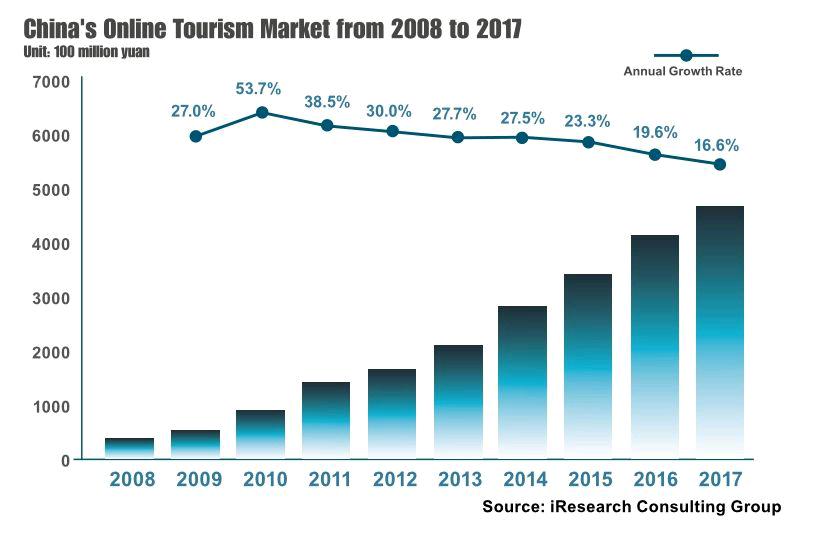Reinventing Wheels:Tourism Goes Digital
2014-07-28byZiMo
by+Zi+Mo
On the eve of the three-day hol- iday for International Workers Day, Beijing engineer Bai Yunfei was planning a trip to Hainan Island with his wife and child. Instead of consulting local travel agencies about a group tour, he booked tickets, hotel and other activities through his smart phone. “Its convenient and cost effective,”he grins. “And online comments help me find more reliable hotels and service.”
In recent years, with the popularity of internet payments, consumers are becoming more comfortable paying for plane tickets, hotels, and other tourism products online. In China, the tourism industry is moving from offices to online.
Growing Market
The internet is not only changing methods of shopping, but also offering unprecedented convenience for travelers. Today, a vacation is no longer limited to an inclusive packaged tour sold by a brick- and-mortar travel agency.
Around 2006, a handful of online travel agencies, including Tuniu.com, LY.com, and Uzai.com, emerged in the Chinese market. The boom of online travel agencies made ticket and hotel booking as easy as a click, and new enterprises began eating into market shares formerly dominated by traditional travel agencies.
“The biggest advantage of online travel agencies is lower prices,” remarks Hu Zhiliang, director of the Industry Research Center under China Investment Corporation. “Contrasting their traditional rivals, they dont have to pay for brick-and-mortar offices. In general, online travel services are 5 to 10 percent cheaper than their offline counterparts.”
Moreover, travel websites such as eLong.com and Qunar.com are big hits with more adventurous customers who
prefer customized itineraries at the lowest possible prices.
According to the 2014 Report on Chinese Consumers Willingness to Pay for Travel published by Ctrip.com, one of the countrys biggest travel websites, 73 percent of tourists now buy tickets via the internet due to the comparatively lower
prices, and only about 25 percent of travelers still buy from ticket offices.
According to Tang Zhengrong, chief technology officer of Tuniu.com, an
online travel agency recently listed on NASDAQ, despite the fact that Chinese demand for travel grows with increasing income, traditional travel agencies are still in trouble because demand for offline travel services is shrinking. The primary reason for the phenomenon is that the younger, tech-savvy demographic has already become the majority in Chinas tourism market. Having grown up in the era when e-commerce emerged, they are perfectly comfortable purchasing products and services on the internet.
Along with the changes in spending habits, the online travel market continues growing. The 2014 Report on Chinas Online Travel and Vacation Market is
sued by iResearch, a market research and consulting group, shows that online travel transactions hit 218 billion yuan in 2013, up 27.7 percent over the previous year, and estimates that the figure will double to 478 billion yuan by 2017.
Going Online
Facing competition from travel websites, traditional travel agencies including China International Travel Service Co., Ltd. (CITS) and China Youth Travel Service (CYTS) have gone online and built websites or formed partnerships with existing e-commerce platforms.
Back in 2005, CYTS had already launched Aoyou.com as an online platform to sell its customized travel services. According to Luo Haijing, CEO of Aoyou.com, those who prefer customized travel are more likely to book via the internet.
While big travel agencies like CYTS established their own sites, many smaller firms sell their products and services through popular third-party travel websites to save operational costs.
Lured by the booming market, Chinas three largest internet brands – Baidu, Alibaba and Tencent – are all testing the waters of tourism. Baidu invested in Qunar.com, Tencent partnered with eLong.com and LY.com, and Alibaba launched the “On the Road” app as well as hotel booking service through its price comparison site eTao.com.
Offline Service Still at the Core
Although travelers can book tickets, hotels, and tours online, they still must consume offline. Like all e-commerce, online tourism services are worthless if the real-world products are poor.
“The purpose of online travel services is to make travel easier and cheaper, but success of the trip depends on local resource quality and infrastructure,” remarks Dai Bin, director of China Tourism Academy.
Travel websites are challenging traditional travel agencies in terms of business modes, but they remain only agents and salespeople. To a large extent, they still depend on traditional travel providers for offline service.
“Online travel companies have tremendous advantages in pricing and convenience,” comments Hu Zhiliang, “so tourism websites have developed fast and become significant players in the market. At the same time, traditional travel agencies are looking to expand through online sales. In the future, travel agencies that can best integrate online and offline services will find a crucial edge in the competitive market.”
